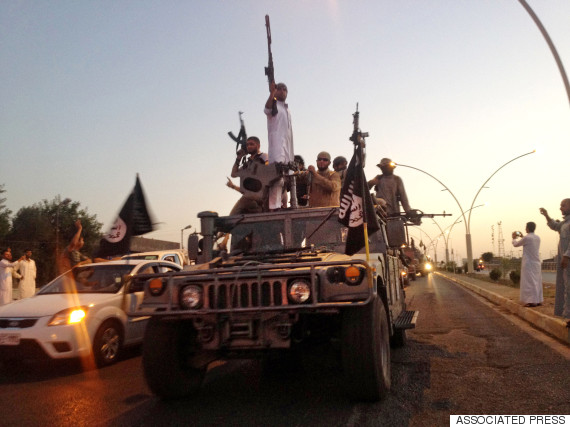
A year after Islamic State militants overran Iraqi security forces to seize Mosul, life in Iraq's second-largest city has become rife with oppression. Women's rights are restricted under penalty of flogging, minorities have had their homes seized and brutal laws are in effect.
In the days after IS took over Mosul on June 10, 2014, the group moved quickly to implement their harsh rules on the city's residents, as well as set up social services and bureaucratic institutions to consolidate its power.
Over the year since the takeover, reports have trickled out from residents that paint an extremely dire picture of life under IS governance. Some of the problems facing the city are the result of immediate edicts issued by the group, while others are symptoms of IS' deteriorating ability to provide basic services.
An estimated 500,000 people fled the city as IS militants made their advance to seize it, but a large civilian population still remains. People living in Mosul say that it is nearly impossible for them to leave, with routes out of the city blocked and strict measures imposed to prevent escape. Residents must send the title to their homes to militants in order to be granted two-week leave, losing it entirely if they fail to return, according to the Associated Press.
A completely accurate picture of life in Mosul under IS is difficult to ascertain due to the stifling restrictions on communications and freedom of speech. The group has taken efforts to show that it is successfully running the city, releasing a propaganda video in January featuring kidnapped journalist John Cantlie touting access to electricity and bustling markets. The group also has supporters in the city, who have praised the militant rule for bringing order. But while IS has attempted to positively portray life in Mosul, reports from residents expose rampant rights abuses and widespread fear.
Female residents of Mosul have suffered some of the worst oppression. All women must wear a full black niqab, with a secretly shot video obtained by the BBC showing a militant chastising a woman for not wearing gloves along with her full-body covering. Male relatives must also accompany women in order for them to leave the house, and religious police known as Hisbah can issue beatings for those who fail to comply.
The dress code extends to women in professional roles such as nurses or doctors, and as a result hospitals are now nearly devoid of female workers, residents told The Guardian.
Militant control over life in Mosul extends to education, where schools have been shut down or replaced with IS-approved teachings aimed at indoctrinating students, sources in the city revealed to the BBC. Science subjects have been removed from the curriculum, one resident told Al Jazeera.
IS has imposed brutal punishments for disobeying its laws, with sentences for small transgressions such as smoking cigarettes involving flogging, according to residents. The group is said to penalize acts that it deems more serious crimes with even more draconian punishment, including cutting the hands off of thieves and stoning women to death for adultery.
A widowed woman who stole a ring for money to feed her family explained to The Guardian how she was brought in front of two judges who ignored her pleas for mercy. She was later taken to a room where her left hand was tied to a table and then chopped off at the wrist.
In June, images were posted online allegedly depicting the murder of three men in Mosul who the group accused of being gay, showing large crowds gathered to watch the militants drop their victims off the top of a tall building.
IS has destroyed shrines and Shiite mosques in the city that it has deemed to be committing apostasy, or that conflict with its interpretation of Sunni Islam. In one notable case, militants blew up the tomb said to house the biblical figure Jonah. They have also destroyed Sunni mosques that they proclaimed "un-Islamic."
After the militants seized the city, Christians in Mosul were forced to convert to IS' interpretation of Islam, pay a tax or be executed. Almost all fled the city, leaving entire neighborhoods abandoned. Their homes were confiscated and branded with an "N" to indicate that they were “Nasrani,” a term IS uses to refer to Christians, according to video obtained by the BBC.
In addition to the litany of repressive measures implemented by IS, Mosul citizens have also faced a lack of access to clean water and electricity. A resident told the BBC in December that contaminated water had made many people sick, and that with the mobile network down at the time, it was hard for sick people to reach out for help. A journalist living in the city said that same month that the water was mostly undrinkable, according to The Washington Post.
Electricity is sparse and only works a few hours a week, residents told The Guardian. IS also reportedly shut down Internet and phone services in December.

The economy in Mosul is said to be in a state of crisis, while the Iraqi government continues to pay salaries to civil servants in the city out of fear that stopping the payments would cause a total collapse of services and backlash against Baghdad.
The government offensive to take back Mosul has been stalled since IS took over the city of Ramadi in May, with American officials telling The New York Times that the advance may not happen until 2016. The delay is also a result of the U.S. plan to boost the training and capabilities of Iraqi troops to more effectively fight IS and wean the government off reliance on militias.
Meanwhile, IS militants in Mosul are celebrating the anniversary of capturing the city on Wednesday, the BBC reported. Residents of the city are allegedly being forced to put up posters and decorations for their occupiers.

